Key takeaways:
- Loneliness during Covid was characterized by emotional isolation despite physical proximity to others, highlighting the need for genuine connections.
- Maintaining quality social connections through regular communication and shared interests is essential for mental health and well-being.
- Engaging in creative activities and physical exercise can alleviate feelings of loneliness by fostering connections and enhancing mood.
- Building a support network requires vulnerability and initiative, reinforcing the idea that reaching out can strengthen relationships and combat isolation.
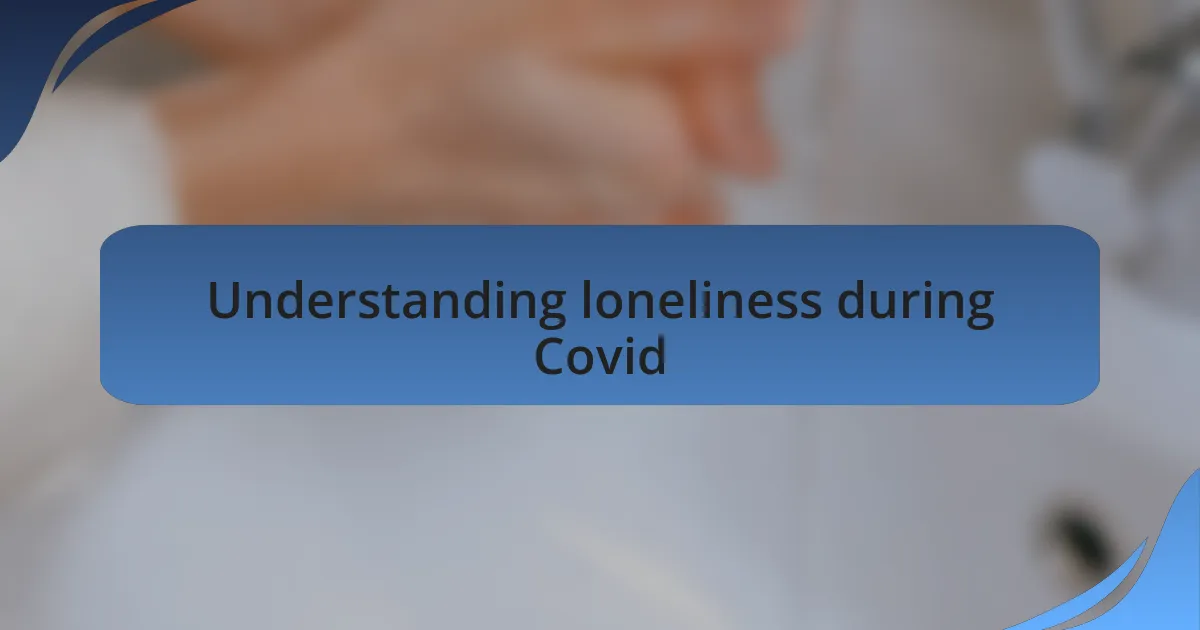
Understanding loneliness during Covid
Loneliness during Covid was a unique experience for many. I remember standing by my window, watching the world go by, feeling like I was in a bubble. Even in a city bustling with life, it felt as if the vibrant connections I once took for granted had vanished overnight, leaving a profound emptiness.
It’s fascinating to consider how loneliness isn’t just about being physically alone but also about emotional isolation. I often found myself surrounded by family, yet the lack of genuine connection felt palpable. Have you ever felt that disconnect, even in a crowded room? It’s a reminder that true companionship goes beyond just sharing space; it requires emotional engagement.
Additionally, the pandemic blurred the lines between social media connections and real-life relationships. Scrolling through endless posts during lockdown, I sometimes felt more disconnected than ever. It made me question, what does it mean to truly connect? Those reflections brought me closer to understanding my own needs for companionship and the importance of nurturing those bonds, even in challenging times.
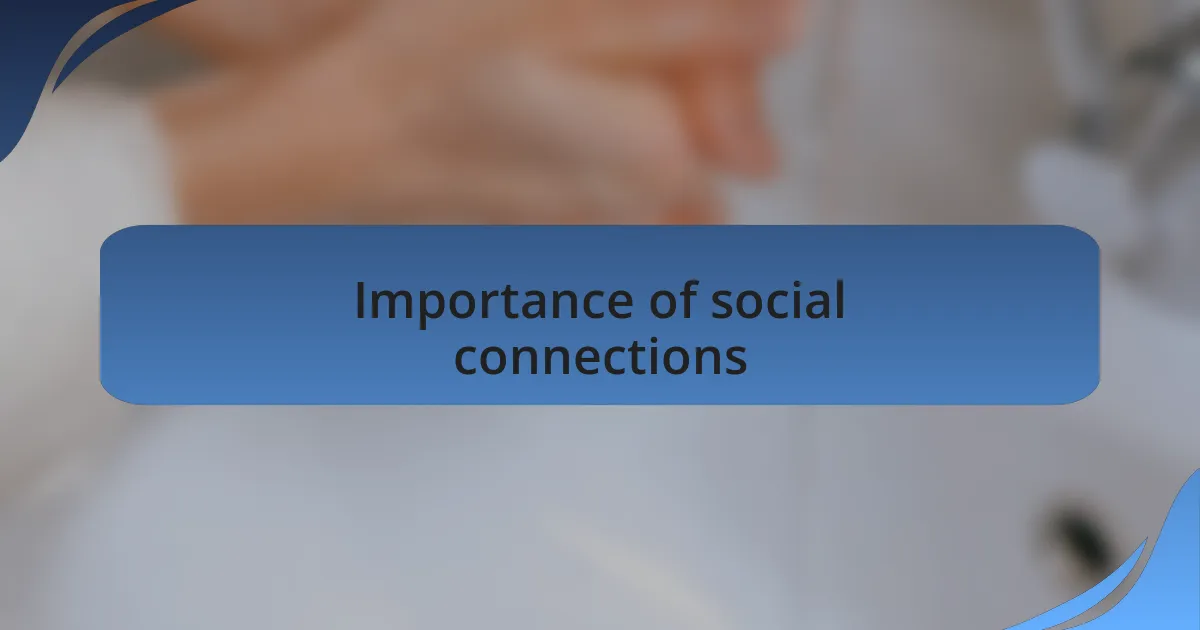
Importance of social connections
Social connections are the lifeblood of our mental and emotional well-being. I realized this during countless video calls with friends who became my lifeline when the world felt isolating. Have you ever noticed how a simple chat can lift your spirits? It’s remarkable how meaningful conversations, even if they’re virtual, can diminish feelings of loneliness.
Reflecting on my own experiences, I’ve learned that the quality of relationships matters more than the quantity. A phone call with a dear friend can be more fulfilling than a group chat where everyone is merely going through the motions. I find that deep, honest interactions bring a sense of belonging that superficial exchanges just can’t replicate. How do you cultivate those deeper connections in your life?
In these uncertain times, maintaining social ties has never been more important. I’ve discovered that even small gestures, like sending a thoughtful message or sharing a memory, can foster a sense of community. Have you tried reaching out unexpectedly? It might just surprise you how a little effort can revitalize a relationship and create a sense of togetherness that combats loneliness.
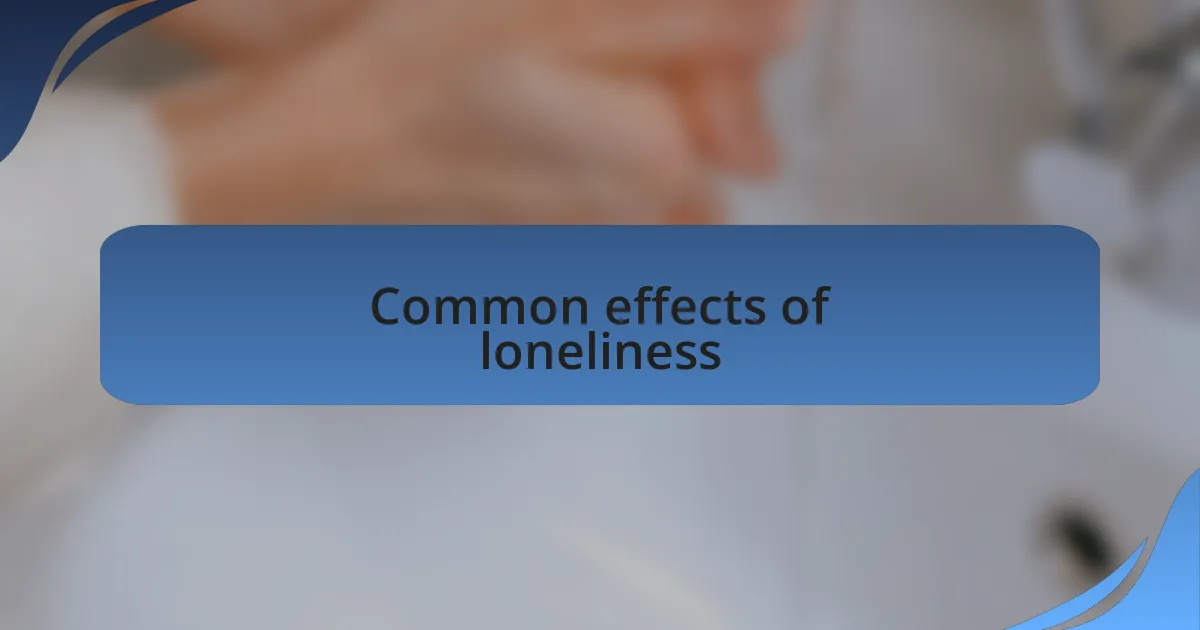
Common effects of loneliness
Loneliness can seep into every corner of our lives, often leading to feelings of sadness and even depression. I remember a period when I felt isolated, and it manifested as a constant heaviness in my chest. It’s unsettling how just being alone can impact our mood and mental health, making tasks feel overwhelming and joy seem elusive.
In my experience, loneliness can also take a toll on our physical health. During one particularly lonely winter, I noticed my energy levels plummeted, and even small activities felt like a chore. It’s fascinating how our emotional state can influence our physical well-being. Have you ever noticed that when you feel lonely, your body just doesn’t respond the same way?
Moreover, loneliness can lead to a cycle of withdrawal, where the more isolated we feel, the less likely we are to reach out. I’ve found myself scrolling aimlessly through social media, feeling even more disconnected as I compare my life to others. It made me wonder: how do we break that cycle and remind ourselves to reconnect with those who truly matter?
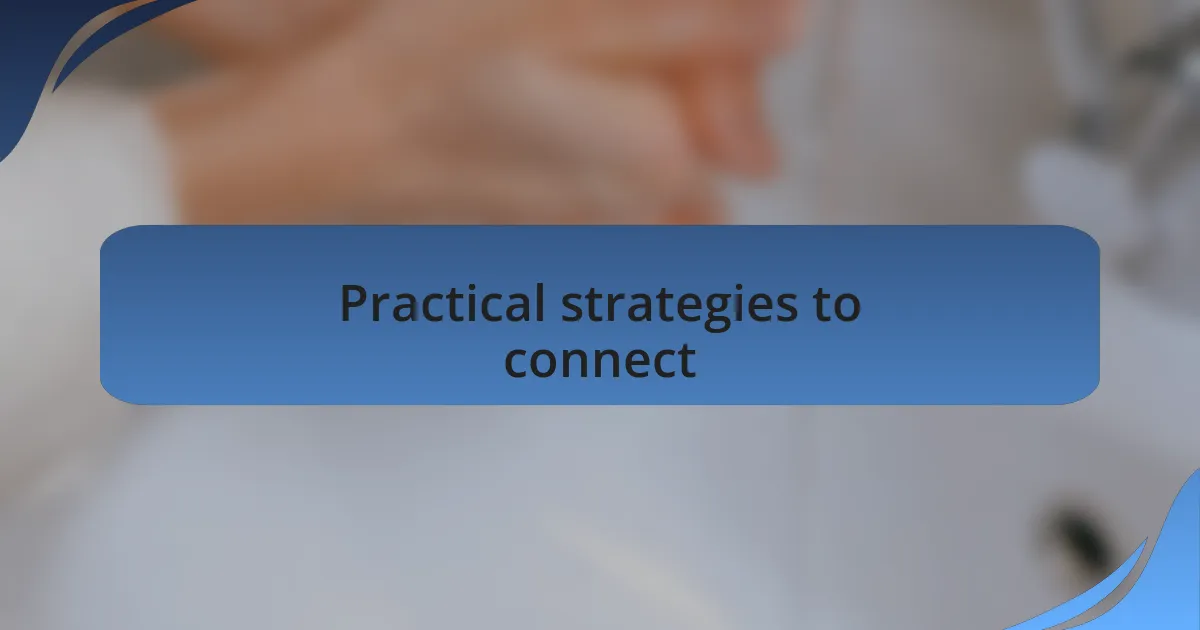
Practical strategies to connect
It’s important to seek connection, especially during challenging times. One of my favorite practical strategies is to schedule regular video calls with friends or family. I remember the first time I did this; it felt strange at first, but seeing familiar faces and sharing laughter made me feel more grounded and less alone. Have you tried setting a routine for these calls? You might be surprised at how it brightens your day.
Another effective method is to join local or online community groups that focus on shared interests. A couple of months ago, I joined a virtual book club, and it opened up a whole new world of conversations and friendships. Just the simple act of discussing a book with others made me feel part of something larger. It’s amazing how shared passions can diminish feelings of loneliness, isn’t it?
Lastly, volunteering can be an incredibly fulfilling way to connect with others. I vividly recall volunteering at a local shelter; not only did it allow me to meet new people, but it also filled me with a sense of purpose. Helping others can transform our perspective and help us realize that we are part of a community, and it’s heartwarming to see how those connections can flourish when we least expect them. Have you considered giving your time to a cause you care about?
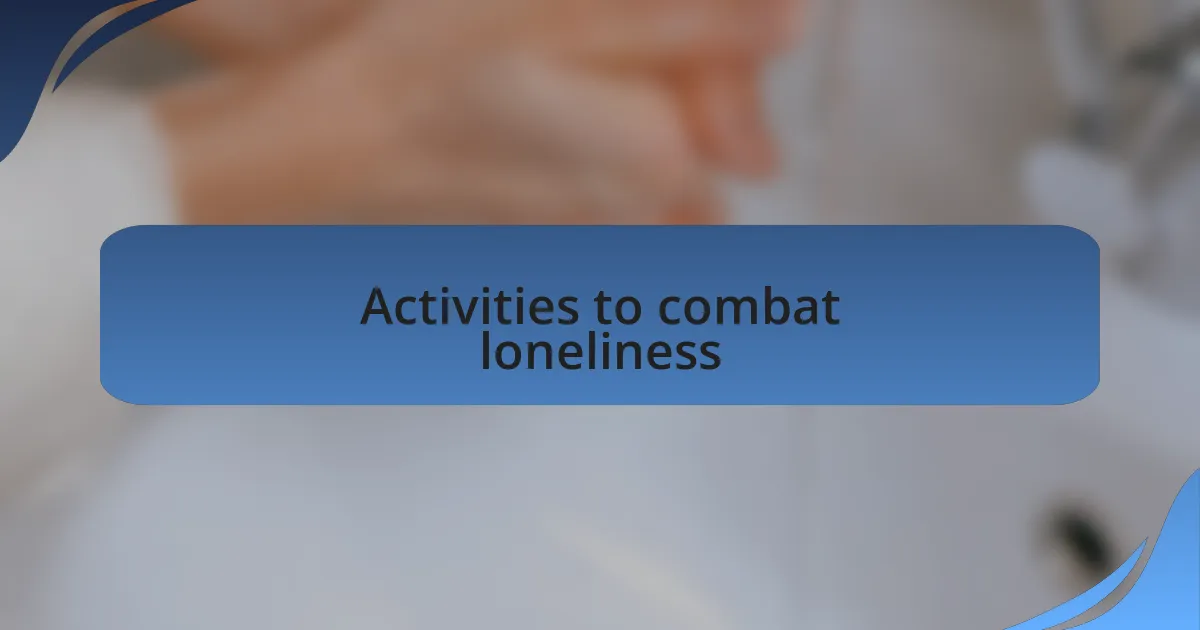
Activities to combat loneliness
Engaging in creative activities can be a wonderful antidote to loneliness. I remember when I decided to take up painting during the pandemic. At first, it was just a way to kill time, but as I immersed myself in colors and canvases, I found a unique way to express my feelings. Have you ever experienced that rush of creativity? It’s almost like making art becomes a conversation between your mind and heart, easing the weight of solitude.
Trying out new hobbies can also bridge the gap between isolation and socialization. I stumbled upon a cooking class online, and that single decision transformed my evenings. Sharing my culinary adventures with friends over social media not only sparked fun interactions but also allowed me to relish their experiences as well. Isn’t it fascinating how food can bring people together, even if we’re not physically in the same space?
Physical activities are equally important in combating loneliness, as they lift both mood and energy levels. When I started studying yoga, I found a community of like-minded individuals. Even though we practiced through a screen, the collective energy felt palpable. Isn’t it remarkable how movement can foster connections, even from afar? Embracing these shared experiences can create lasting bonds, reminding us that we’re never truly alone.
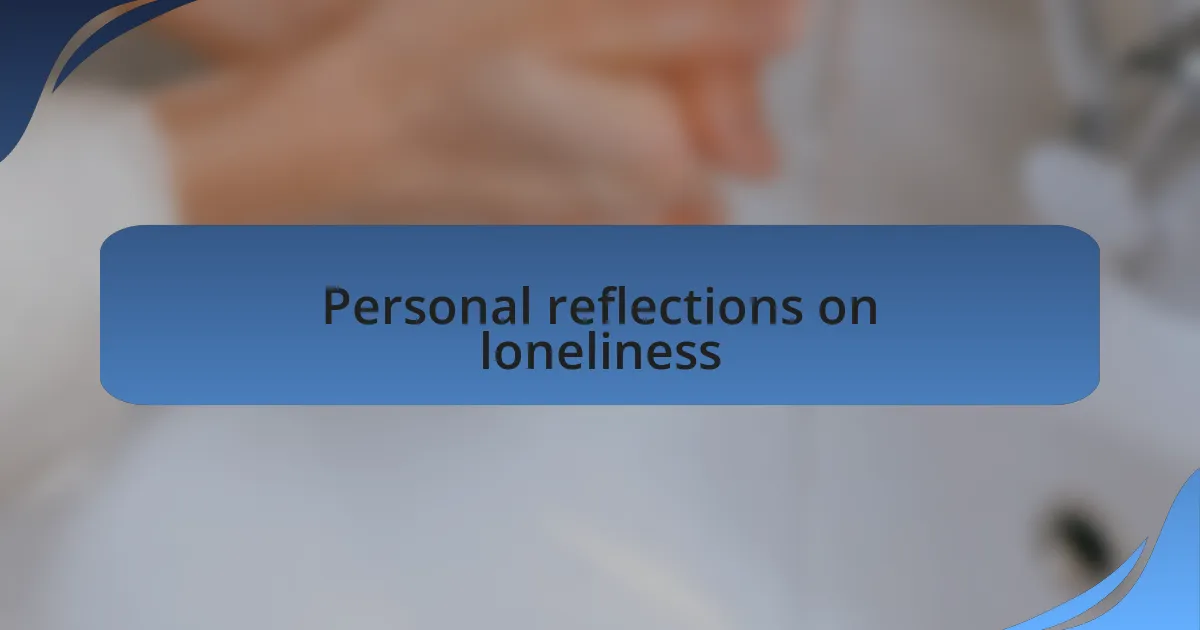
Personal reflections on loneliness
Loneliness can feel overwhelming, especially when it creeps in during quiet moments. I recall a time when I would sit on my porch, staring at the stars, and feel a sharp ache of solitude. It’s in those stillness-filled nights that I learned the power of self-reflection. Have you ever noticed how your thoughts can echo louder when you’re alone? It made me realize that embracing these moments could transform loneliness into an opportunity for self-discovery.
During the pandemic, I often reminisced about social gatherings and the laughter shared with friends. The longing for connection was palpable, and I found myself reaching out to old acquaintances just to hear their voices. Those simple phone calls became lifelines, showing me that loneliness can be a shared experience. Isn’t it interesting how vulnerability can forge deeper connections? In opening up about my feelings, I discovered that others were often experiencing the same sense of isolation.
I’ve learned that accepting loneliness is part of the human experience. It’s okay to feel disconnected at times. Sometimes, when I found myself feeling particularly lonely, I would write in my journal, spilling my thoughts onto the pages. This practice not only helped me process my emotions but also became a therapeutic tool that alleviated the weight of solitude. Have you tried putting your feelings into words? It’s surprising how articulating those emotions can lighten the heart and remind us that we’re not as isolated as we might think.
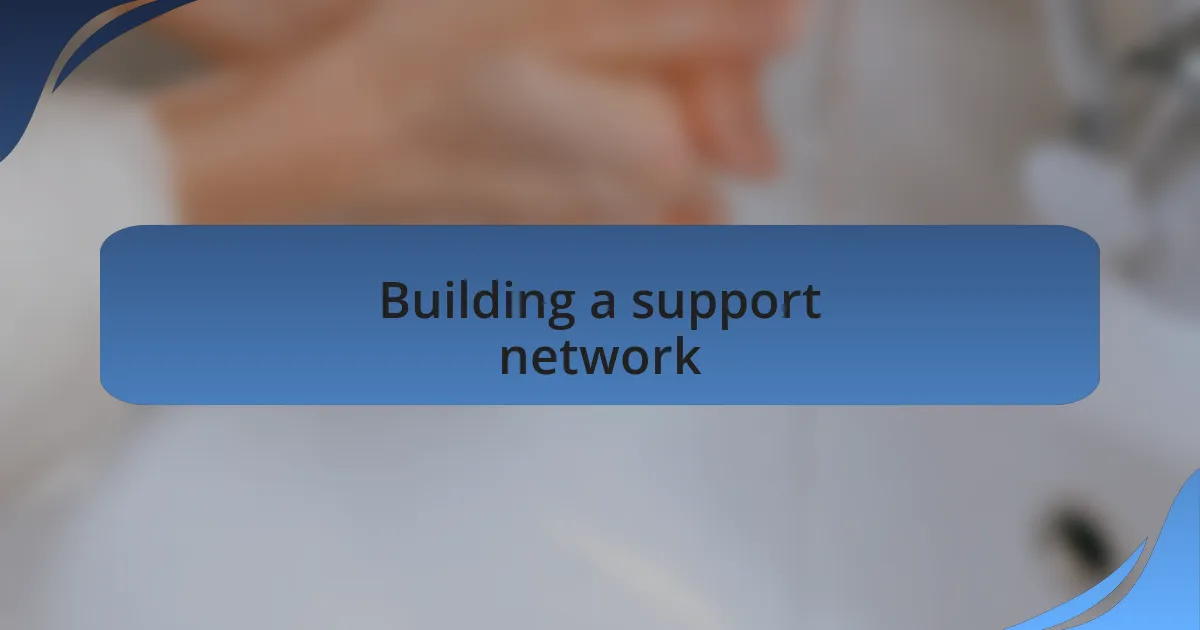
Building a support network
Building a support network is crucial in navigating moments of loneliness. I remember a time during the lockdown when I decided to revive my college group chat. Initially, it felt awkward, almost like stepping back into a room full of strangers, but that small act quickly turned into a space of camaraderie. Have you ever witnessed how a shared joke or a fond memory can instantly bridge the gap of time?
I’ve found that actively cultivating relationships enhances not only my mood but also my sense of belonging. Joining online groups based on hobbies or interests provided me with a sense of community I desperately craved. There were times I felt hesitant in reaching out, questioning if I’d be a bother. Yet, each time I took that leap, it reminded me that connection often starts with vulnerability—have you ever felt the weight lift simply by reaching out?
Creating a support network doesn’t always mean waiting for others to make the first move; sometimes, it means taking the initiative to connect. One evening, I decided to host a virtual coffee chat with friends—just to check in and share how we were coping with the uncertainties. The laughter and stories we exchanged brought a warmth I hadn’t anticipated. Isn’t it amazing how a simple invitation can weave stronger ties?